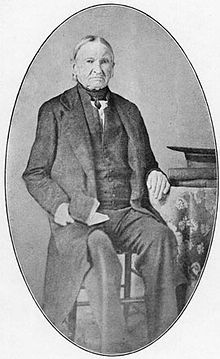David Willson (1778–1866)
| David Willson | |
|---|---|

David Wilson, ca 1866
Reform Leaders
|
|
| Born |
7 June 1778 Duchess County, New York |
| Died | 14 January 1866 (aged 87) Sharon, Ontario |
| Occupation | minister, reform politician |
| Known for | Sharon Temple |
David Willson (1778–1866) was a religious and political leader who founded the Quaker sect known as, 'The Children of Peace' or 'Davidites,' based at Sharon (formerly Hope) in York County, Upper Canada in 1812. As the primary minister to this group, he led them in constructing a series of remarkable buildings, the best known of which is the Sharon Temple, now a National Historic Site of Canada. A prolific writer, sympathizer and leader of the movement for political reform in Upper Canada, Willson and his followers ensured the election of William Lyon Mackenzie, and both "fathers of Responsible Government", Robert Baldwin and Louis LaFontaine, in their riding.
Born on his parents' rented farm on the Nine Partners' Grant in Dutchess County, New York, Willson was the son of Irish immigrant John Willson (died circa 1794) and his second wife Catherine (1754-1840). David Willson would later describe his parents as having been 'poor but pious Presbyterians'. Following his father's death David Willson lived for a time in New York City and sailed on the Farmer, a sloop in which his family had invested. He married to Phebe Titus (1777-1866), a member of the Society of Friends, for which she was initially disowned. In 1801, age 23, David Willson and other members of his family, including his widowed mother, younger brother, John (b.1781), and sisters Anne (1786-1824) and Mary (c.1792-1858), followed the example of his elder half brother, Hugh (1768-1828), and emigrated to Upper Canada. They settled in East Gwillimbury Township in York County.
Willson joined the Yonge Street Meeting of the Society of Friends (in what is now Newmarket) in 1805, and "served them according to their laws and discipline for seven years in all good faith and practice of the society, [yet] still retaining [his] secret impressions as sacred from the ears of all flesh." Quakers adhered to a strict "Discipline" on their behaviour, but had no fixed creed. Ministry was spontaneous, as called by the "inner light" of God who made "secret impressions" on the believers mind. During this period, Willson did not minister, but served as an active overseer and record keeper, as well as donating the land for a meeting house (church) on his farm.
...
Wikipedia
